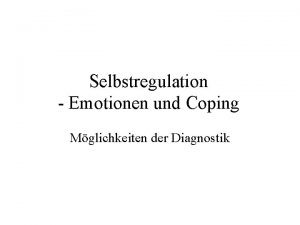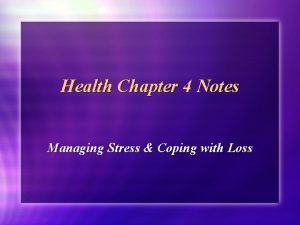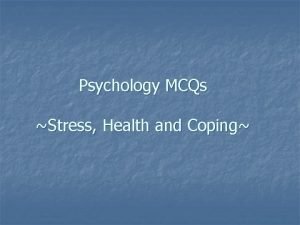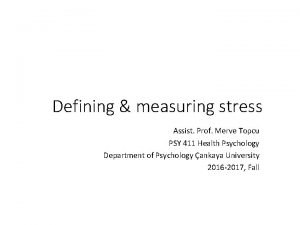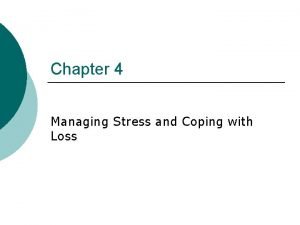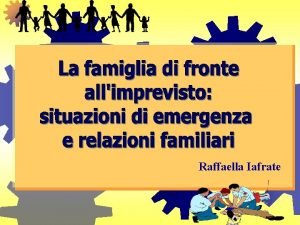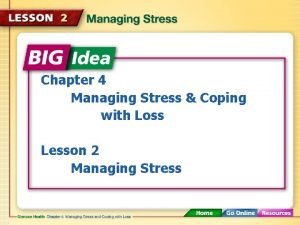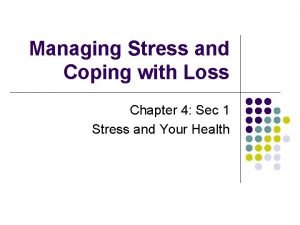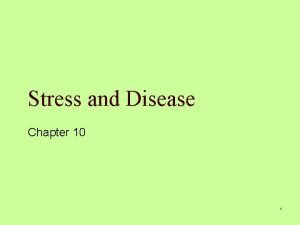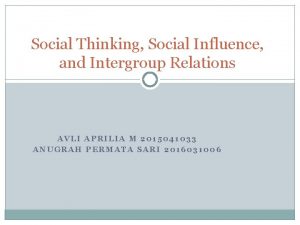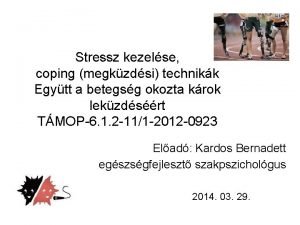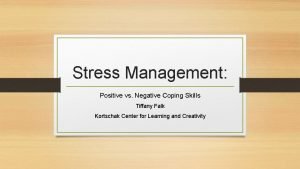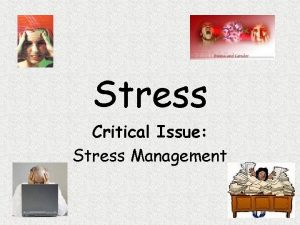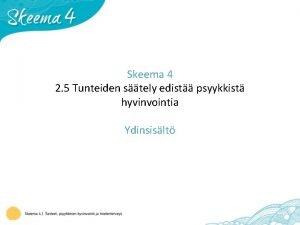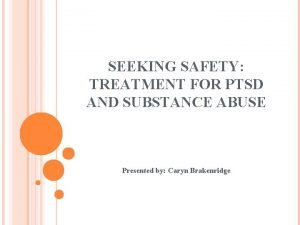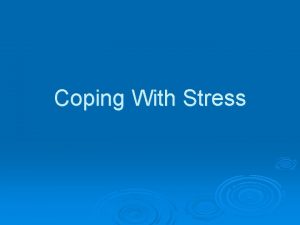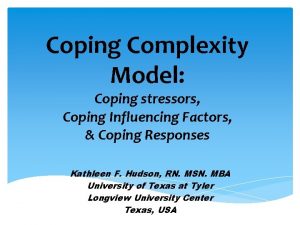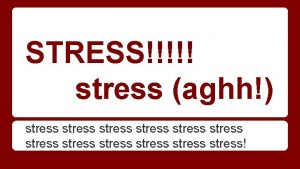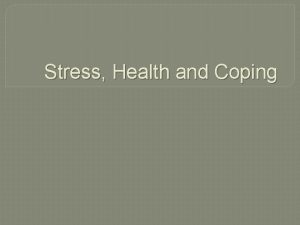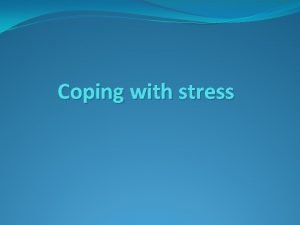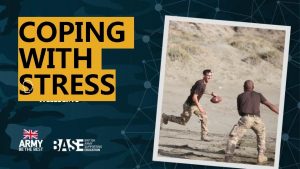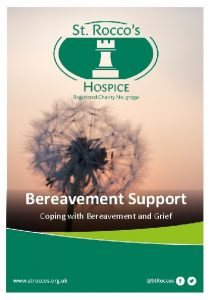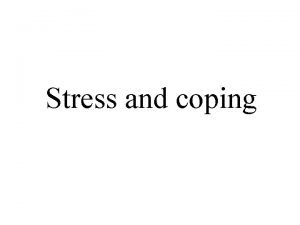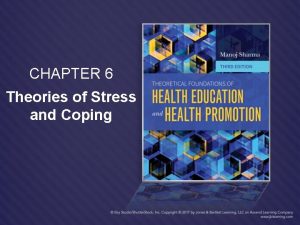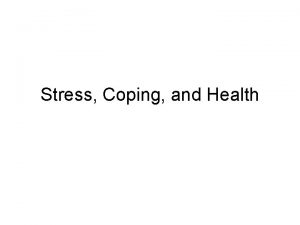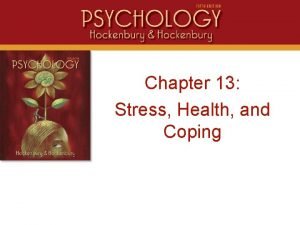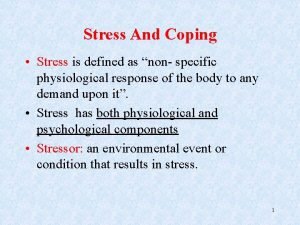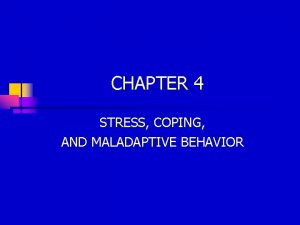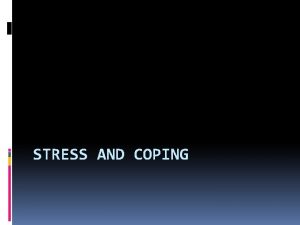Stress Social Support and Coping I The Stress

























- Slides: 25

Stress, Social Support, and Coping I. The Stress Response.

The Stress Response • Fight or Flight –Short-term = physiological responses aide flight or fight. –Long-term = if chronically activated, they contribute to disease processes.

A Comprehensive Model • Stress is a stimulus, not an outcome. • Scales metaphor.

Stress, Social Support, and Coping II. Stressors

Major Life Events • Holmes and Rae (1967) –The Social Readjustment scale. –Weaknesses with this approach: • /

Daily Hassles • Kanner et al. (1981) studied daily hassles and uplifts

Ambient/Chronic Stressors • Poverty. –Vicious spirals. • Racism. –Constantine & Sue (2007) micro-aggressions.

Stress, Social Support, and Coping III. Appraisal

Stress: Looking at Ourselves • The Interview –Was the situation short-term or long-term? –What was stressful about the event? i. e. , what psychological meanings did the event have for you? –What resources helped you cope with the event? –What were your coping behaviors? –Did you believe that you had the ability to cope effectively with this situation. –In your estimation, how severe was the distress that you experienced as a function of this event (e. g. , mild, moderate, severe).

Appraisal • Lazurus and Folkman (1984). Stress is in the eye of the beholder. –The experience of negative emotion in the face of a stressor depends on two types of appraisal processes: primary and secondary. –Primary Appraisal: –Secondary Appraisal:

Appraisal (cont. ) –One implication of this view is that if appraisal is what leads to symptoms, you can cope with stress by reappraisal. –Some theorists have taken issue with this perspective (Hobfoll, 1998), arguing that some events are just universally stressful.

Stress, Social Support, and Coping IV. Resources

Social Support • Benefits of social support. –Social support is positively correlated with: Academic performance & commitment, cardiovascular, endocrine and immune system functioning, job satisfaction, life satisfaction, and parenting skills. • Perceived vs. enacted support distinction. –Perceived support refers to a generalized belief that people value you and would be there for you in a time of need. Enacted support is specific help that you receive from others.

Social Support (cont. ) • Novel sources of support –Natural helpers. Bartenders, beauticians, etc. –Mentoring programs. – Experience decreased substance abuse, greater self-efficacy and self-esteem, improved independent living skills, and higher performance on measures of academic achievement than children and adolescents without such relationships (e. g. , Grossman & Tierney, 1998). – Are more likely to experience improvements in peer and family relationships as compared to youth who have not participated in such programs (Rhodes, et al. , 1999; Rhodes, et al. , 2000).

Social Support (cont. ) –Media sources. • With the Grandma Please program in Chicago (Szendr & Joese, 1996) after school children call and elderly volunteer for company. • Online support Groups. --van Uden-Kraan et al. (2008). Analyzed the content of support groups for breast cancer, arthritis, and fibromyalgia. --Feigelman et al. (2008). Compared internet versus face-toface support groups for parents who lost a child to suicide.

Social Support (cont. ) • The down side. • Reciprocity of support. –Maton (1987, 1988) found that reciprocity of support was associated with greater well-being.

Resilience –A few observations about early resilience theory and research. –The Kauai Longitudinal studies (Werner & Smith, 2001). • Background. • Predictors of thriving. • Additional observations. –Recent trends in resilience research. • Promoting Alternative Thinking Strategies (PATHS; Greenburg et al. , 2007).

Spirituality and Religion • Specific aspects that are helpful. –A personal relationship with God can be a source of support. –A religious or spiritual framework can provide a sense of meaning or guidance during uncertain or frightening times. –Prayer and meditation can be soothing. –Congregations can be an enormous sources of enacted support.

Spirituality and Religion (cont. ) • Negative aspects. –When a person interprets a stressor in a spiritual way that prevents helpful coping. –When a congregation shuns an errant member.

Spirituality and Religion (cont. ) • Research on outcomes (Pargament, 1997) –Religious coping appears to be especially helpful in the face of extremely stressful, uncontrollable situations. –Religious coping predicts positive outcomes even after statistically controlling for non-religious coping methods.

Stress, Social Support, and Coping V. Coping Responses

Coping Responses • Problem-Focused. –Lazarus and Folkman (1984).

Coping Responses (cont. ) • Emotion-Focused. –Positive: –Negative:

A comprehensive list of coping skills Skinner et al. (2003) 1. 2. 3. 4. 5. Problem solving Support seeking Avoidance Distraction Positive cognitive restructuring 6. Rumination 7. Helplessness 8. Social withdrawal 9. Emotional regulation 10. Information seeking 11. Negotiation 12. Opposition 13. Delegation

Coping Responses (cont. ) • Stress management groups. –Relaxation training. –Assertiveness training. –Time management. –Cognitive restructuring.
 Stress strain coping support model
Stress strain coping support model Selbstregulation
Selbstregulation Leasiest
Leasiest Mcqs on stress management
Mcqs on stress management Stress appraisal and coping
Stress appraisal and coping Chapter 4 managing stress and coping with loss lesson 1
Chapter 4 managing stress and coping with loss lesson 1 Family stress and coping
Family stress and coping Chapter 4 managing stress and coping with loss
Chapter 4 managing stress and coping with loss Managing stress and coping with loss
Managing stress and coping with loss Coping strategies for exam stress
Coping strategies for exam stress Major and minor ideas
Major and minor ideas True stress vs engineering stress
True stress vs engineering stress Chapter 10 stress responses and stress management
Chapter 10 stress responses and stress management Lesson 3 coping with loss and grief
Lesson 3 coping with loss and grief Feather core blockboard
Feather core blockboard Social thinking and social influence in psychology
Social thinking and social influence in psychology Social thinking social influence social relations
Social thinking social influence social relations Definition of axial stress
Definition of axial stress Karasekin malli
Karasekin malli Coping technikák
Coping technikák Define coping skills
Define coping skills Problem-focused coping examples
Problem-focused coping examples Stress versus burnout
Stress versus burnout Skeema 4
Skeema 4 Seeking safety coping with triggers
Seeking safety coping with triggers Details
Details

